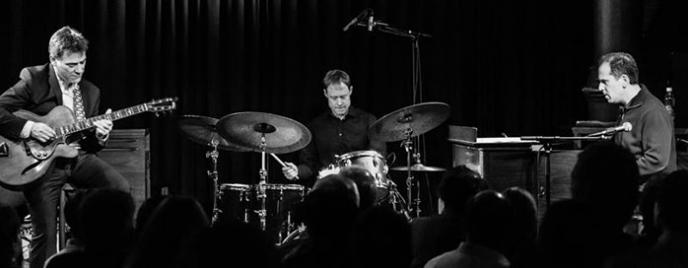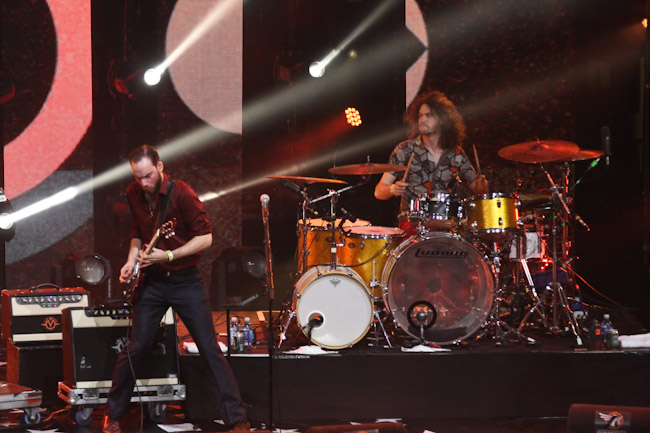Interview met Brian Viglione van The Dresden Dolls
"Provide structure and foundation."
On Stage 17-04-2006 02:17
Het Brechtiaans punkduo The Dresden Dolls bestaat uit Amanda Palmer en Brian Viglione. Hun nieuwe album "Yes, Virginia" ligt sinds 17 april in de winkels. Slagwerkwereld sprak met drummer Brian Viglione, onder meer over spelen in een duo en het succes van The Dresden Dolls.
Itís an interesting concept that represents our music: the image of this doll, a hallmark of prewar Dresden industry thatís a delicate and vulnerable object. And at the same time the chaos of the firebombing of Dresden. The Brechtian idea that art can change the world is an element that suits us. Thatís what we want to tell also, but we need to be careful that we donít try to over illustrate the meaning what we do as an artist. We try to keep it balanced. We donít use Brecht as a guiding force. In fact, Amanda used this term also to get people interested in the band.
The Dresden Dolls get critics like ďcoolĒ and ďhipĒ. How do you experience whatís happening to you?
Itís a natural progression of whatís been going on. Weíre very thankful and grateful for the open and kind reception weíve got from the press and the fans, and dedicated to put out good music and great performances. We enjoy this life, because itís the thing we wanted to do when we were little. Itís very fulfilling, but also difficult in a certain sense. Doing 9 hours of press for twelve days is different as suppose of dreaming about being in a band when we were twelve years old. It has provided a lot of challenges also to grow as people. But with the greater rewards, the greater the sacrifice. I would say there is definitely a lot of benefit from having a job where youíre are always at home and get to see youíre friends when work is done. But than I would have done a job, that I feel is not really me.
Since you met Palmer and started The Dresden Dolls youíre life has changed completely. What did you learn as a drummer these last years?
I think I learned how to play less, which is one of the most difficult lessons. Playing less but still managing to put my own vision and personality into the music without feeling that I sort of fading into the background as some kind of minimalist. I think I tried to develop my eloquence on the drums and Iím still in the early stages in my opinion. I feel I got a lot of work to do to execute my vision and develop my voice on the drums. Amanda offers diversity and she tickles my artistic sensibility. In The Dresden Dolls I can use all kinds of styles: punk, jazz, metal. Itís only piano and drums, but I can play so many different styles. Play double bass, but also use brushes. I get that space, because itís only the two of us. And itís the combination of our backgrounds. We have never tried to stylise the band. If itís inside you, put it into the music. Weíve tried to play with other musicians, like a cellist in the beginning. But we realised that the main essence of band is the communication between me and Amanda and the freedom the duo-setting gave to us.
Would you recommend a duo-setting to a drummer?
I would recommend an ensemble that best suits the music. We might use more musicians in the future, but it will mostly be dictated by how we feel and what the material demands. The bigger the ensemble the more careful you need to be about your place. I can respond more directly to Amanda than a drummer in a big rock band would be enabled to. So there is more spontaneity within this duo, itís like dancing with one other person. Itís only his or her movement to react to. In this duo the freedom comes along with a great responsibility to not overstep my boundaries. My role as a drummer is to support the music. Provide structure and foundation, thatís the guiding principle always for me. Iím just enabled to approach it slightly different than just play a solid groove like in a rock band.
When and why did you start drumming?
The drums is in fact a personal investment from my father, who was also a drummer (though not famous) in me. My parents got divorced and this drumming connection with my father was a way to maintain my relation with him and strengthen our bond. Also my mom was very supported, though she couldnít get her mind around the idea of being a musician. For her, itís a job that just happens by accident. My father on the other hand learned me discipline to develop myself on this instrument. And why specifically drumming? It feels so good; itís a natural outlet for my energy and aggression. Maybe athletes get the same feeling from doing their sport, challenging yourself. Itís a physical release of energy. My parents fought a lot when I was little, and instead of turning that anger and pain inside, I released it on the drums. Itís positive way of channelling negative feelings without harming anyone. I would like to do also other projects which help to develop myself. I sometimes get nervous because I donít have time for that, because The Dresden Dolls is taking so much time. I want to do also other things, otherwise it will be the same exercise every day. Itís like doing push ups every day: youíll get strong arms, but you keep weak legs.
How was your musical life before The Dresden Dolls?
I have never encounted a musical situation like this before. When I was 18 my ideal band in my head was an instrumental group, a cross between the Rollins band, Pantera and John Coltrane. Something very dynamic. When I stepped into this situation I was amazed how much of that I can actually achieve even though it was just one other instrument and lyrics.
Whatís your role in the process of song writing?
Itís always the same system from the first day we met. Amanda writes the songs and the lyrics, I donít, except for sometimes adding some words. She lets me hear her ideas so I can build the song with her. Itís really a process which we donít want to change, but only refine.
The new album is called "Yes, Virginia". Why this title?
"Yes, Virginia" references a reply to a letter run in the New York Sun in 1897 about the existence of Santa Claus. This reaction says: ďSanta Claus is as real as you believe in it.Ē It was a vague reference to the kind of hope and inspiration in the face of the confrontational world that can cause you a lot of disillusion. The role of music is very important to maintain this hope in positivity. Believe in magic. But: The Dresden Dolls are not on a mission, weíre not John Lennon.




